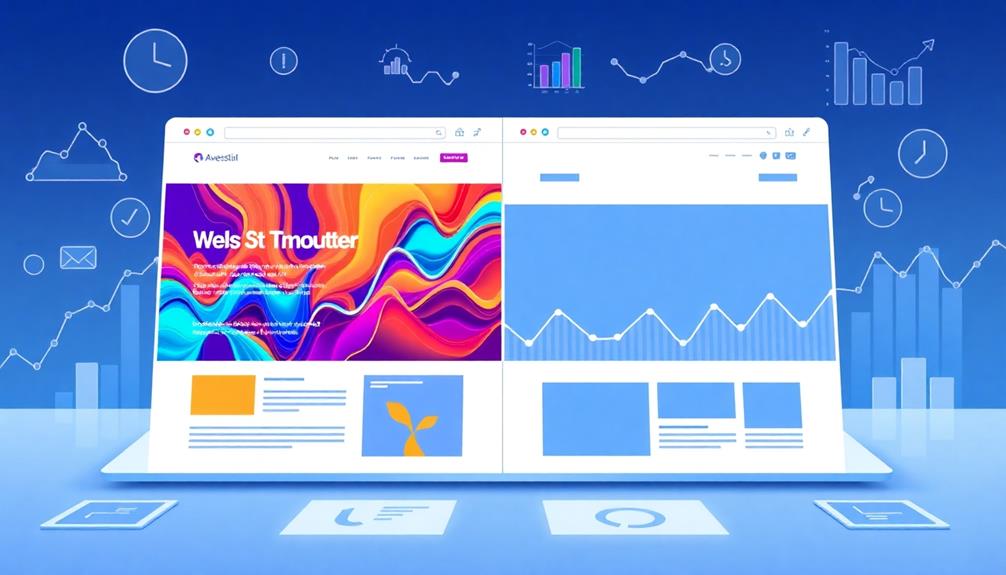To improve your customer's journey, leverage AI tactics like real-time personalization and 24/7 chatbot support. Automate routine inquiries to reduce handling times and free your agents for complex issues. Use predictive analytics to anticipate customer needs and engage proactively. Implement intelligent routing to connect customers with the right agents faster. Enhance training with AI tools that provide real-time feedback. Monitor interactions with AI for quality assurance. Finally, analyze customer data to spot trends and prevent churn. These strategies can considerably boost customer satisfaction and engagement, and there's even more to discover on how to elevate your service.
Key Takeaways
- Implement AI chatbots for 24/7 support, handling routine inquiries and allowing human agents to focus on complex issues.
- Utilize predictive analytics to anticipate customer needs, enhancing proactive engagement and improving overall service quality.
- Leverage personalized recommendation engines that analyze customer behavior to deliver tailored experiences and boost engagement.
- Employ sentiment analysis to prioritize customer interactions based on urgency and emotional cues, ensuring timely responses.
- Use AI-driven training tools to accelerate onboarding, providing new agents with real-time feedback and access to past support tickets.
Understanding AI in Customer Experience

In today's fast-paced digital landscape, understanding AI in customer experience is essential for businesses aiming to thrive. By leveraging technologies like machine learning and natural language processing, you can create personalized experiences that enhance customer satisfaction. AI analyzes vast amounts of customer data, enabling you to deliver hyper-personalized interactions that meet the specific needs of each individual.
Consider the impact of chatbots; 51% of consumers prefer using them for immediate service, reflecting a strong demand for 24/7 support. Implementing AI-driven solutions can lead to an impressive 37% increase in customer satisfaction scores, along with a potential 30% revenue boost. This level of engagement isn't just beneficial; it's expected, as 71% of consumers now anticipate tailored interactions from brands.
Moreover, AI tools can help your customer service teams work more efficiently. By reducing average handling time by 21%, you can manage higher support volumes without compromising quality.
Embracing AI in customer experience not only improves customer experiences but also positions your business for growth in an increasingly competitive market.
Enhancing Customer Service Efficiency

To enhance customer service efficiency, you can start by automating routine tasks that free up your agents to tackle more complex issues.
For instance, leveraging AI technologies like OpenELM for enhanced privacy can help in processing customer data more securely and efficiently.
Proactive engagement strategies powered by AI can also help you anticipate customer needs, leading to quicker resolutions.
Automating Routine Tasks
Automating routine tasks with AI can transform your customer service experience substantially. By implementing AI chatbots, you can manage up to 80% of routine customer inquiries, enhancing threat detection through pattern recognition and anomaly detection. This not only considerably reduces response times but also allows your human agents to focus on more complex issues that require a personal touch.
Automating repetitive tasks can save your business an estimated 220 hours per month, enhancing overall operational efficiency.
Moreover, AI-driven tools can intelligently route inquiries to the appropriate agents, ensuring that customer issues are addressed more accurately and efficiently. This leads to a 21% reduction in average handling time, which is essential for improving customer satisfaction and engagement.
As a result, you'll witness a boost in agent productivity by 20%, enabling your team to handle higher support volumes without sacrificing service quality.
Incorporating these AI tactics doesn't just streamline your operations; it enhances overall service quality. By automating routine tasks, you can create a more efficient, responsive customer service environment that ultimately helps you build stronger relationships with your clients.
Embrace AI to elevate your customer service game today!
Proactive Engagement Strategies
Proactive engagement is a game-changer for enhancing customer service efficiency. By leveraging AI technologies, you can analyze customer data and predict needs, allowing your business to reach out before issues arise. This approach greatly boosts customer satisfaction and fosters long-term loyalty.
Implementing chatbots for common inquiries guarantees your customers receive immediate assistance 24/7, which 51% of consumers prefer. This quick service not only improves their experience but also saves your team time.
Furthermore, AI can intelligently route requests based on conversation analysis, connecting customers to the right agents faster and reducing average handling time by 21%.
Utilizing sentiment analysis, AI tools help you prioritize customer interactions based on urgency and emotional cues. This means your team can swiftly address high-priority issues, enhancing service efficiency.
When you use predictive analytics to anticipate customer needs, you can see a potential 37% increase in customer satisfaction scores (CSAT).
Incorporating these proactive engagement strategies will transform how you interact with customers, leading to personalized experiences that keep them coming back.
Embrace AI to not just meet expectations but exceed them, solidifying your reputation for exceptional customer service.
24/7 Support With Fast Responses

When you reach out for support, you want quick answers that resolve your issues without delay. AI chatbots are here to deliver just that. With 51% of consumers preferring bots for fast service, these intelligent tools provide immediate assistance, ensuring you get help 24/7 through conversational AI. This technology drastically reduces wait times and boosts customer satisfaction.
By automating responses to common inquiries, AI chatbots allow human agents to focus on more complex issues, enhancing efficiency in customer support. This shift not only improves service quality but also leads to reduced average handling times by up to 21%. As a result, you experience a more streamlined customer journey.
Moreover, intelligent tools like macro suggestions and generative AI equip agents to resolve issues more quickly. The combination of fast responses and the ability to handle intricate problems means you receive a well-rounded support experience.
Implementing these AI-driven solutions not only caters to your immediate needs but also prepares businesses to adapt and thrive in an ever-evolving landscape. When you engage with customer support, you can trust that AI is working tirelessly to enhance your experience.
Onboarding and Training With AI

Effective onboarding and training can make or break a new hire's experience, and AI is transforming this process for customer service teams. With AI-driven training tools, you can markedly accelerate the onboarding process for new customer service hires, guaranteeing they become productive more quickly and efficiently.
These tools act as virtual assistants, providing real-time tips and contextual feedback that enhance learning. Additionally, by leveraging NLP for personalized responses, AI can help new hires develop the skills necessary to interact effectively with customers.
During training, AI can surface similar support tickets, allowing new agents to learn from past interactions effectively. This not only aids in skill development but also helps you analyze performance, identifying areas that need coaching.
By facilitating targeted training efforts, AI guarantees that your new hires receive the support they need to thrive.
Moreover, AI adjusts the tone of responses based on context, helping you develop a more personalized communication style with customers. This aspect of training is vital for building rapport and guaranteeing customer satisfaction.
Improving Productivity and Workflow

Streamlining productivity and workflow in customer service is essential for success, and AI is here to help. By adopting AI technologies, you can notably enhance the customer experience while boosting agent productivity and workflow efficiency.
Here are some ways AI can transform your operations:
- Automate repetitive tasks to save agents approximately 220 hours each month.
- Use intelligent routing systems to guarantee tickets reach the most qualified agents, enhancing response accuracy.
- Facilitate real-time access to knowledge bases, speeding up response times and reducing resolution delays.
- Optimize scheduling based on predicted support demand to improve resource allocation.
- Implement AI-driven tools to reduce agent burnout, allowing your team to focus on more complex customer interactions.
Delivering Personalized Customer Interactions

Delivering personalized customer interactions has become an essential component of a successful customer journey. With 71% of consumers expecting personalized experiences, meeting these expectations is vital. When you fail to deliver, 76% of customers feel frustrated. This is where AI-driven recommendation engines come in. By analyzing customer behavior and purchase history, these tools help you provide tailored interactions that greatly enhance customer engagement.
Real-time personalization adjusts your website content to highlight relevant products based on individual preferences, creating a customized shopping experience that can foster customer loyalty. Companies utilizing AI for personalization can see a revenue boost of 40% or more, proving that individualized interactions aren't just beneficial but financially rewarding.
Brands like Starbucks effectively use advanced machine learning to deliver personalized marketing messages, offering menu item suggestions based on previous purchases. This not only improves the overall customer experience but also deepens the connection between the brand and the customer.
Anticipating Customer Needs Proactively

Understanding your customers doesn't stop at personalization; it extends to anticipating their needs before they even voice them. By leveraging AI-driven tools, you can effectively predict customer preferences and behaviors, enhancing the overall customer experience.
Here's how you can do it:
- Behavioral Patterns: Analyze historical data to uncover trends and habits.
- Sentiment Analysis: Gauge customer emotions during interactions to prioritize responses.
- Predictive Analytics: Forecast inquiries and trends to prepare resources in advance.
- Proactive Alerts: Automate notifications about product updates or service interruptions.
- Personalized Recommendations: Suggest offerings based on past interactions to keep customers engaged.
When you anticipate customer needs, you not only improve satisfaction scores—studies show an increase of up to 37%—but you also create a smoother service delivery process.
AI for Quality Assurance and Monitoring

When it comes to quality assurance, AI's performance scoring mechanisms can help you objectively assess your agents.
By identifying trends in their performance over time, you can pinpoint areas for improvement and coaching.
This proactive approach not only enhances individual skills but also boosts overall customer satisfaction.
Performance Scoring Mechanisms
Performance scoring mechanisms are transforming how businesses approach quality assurance and monitoring in customer service. By leveraging AI, you can objectively score agent performance, pinpointing strengths and areas needing coaching. This leads to enhanced service quality and improved customer satisfaction.
With performance scoring mechanisms, you can track key performance indicators (KPIs) to guarantee consistency across all customer interactions.
Here are some key benefits:
- Objective assessments of agent performance through AI analysis.
- Insights from conversation transcripts to identify best practices.
- Continuous monitoring that highlights performance trends and common issues.
- Personalized training recommendations tailored to each agent's needs.
- Proactive measures to address potential challenges before they escalate.
Trend Identification Techniques
Many organizations are turning to AI for effective trend identification in quality assurance and monitoring. By leveraging AI algorithms, you can enhance customer experience management through actionable data-driven insights. These trend identification techniques allow you to analyze customer sentiment and detect patterns that indicate emerging issues.
| AI Capability | Impact on Quality | Outcome |
|---|---|---|
| Natural Language Processing | Identifies sentiment trends | Improved service delivery |
| Performance Monitoring | Flags recurring problems | Proactive resolution |
| Continuous Learning Algorithms | Adapts to new behaviors | Refined quality assurance |
With AI-powered tools, you can monitor large volumes of customer interactions to pinpoint specific areas needing improvement. This enables personalized coaching for your agents, enhancing their skills based on performance data. Ultimately, these techniques lead to a more effective quality assurance process, ensuring that your monitoring remains relevant and effective. Embracing AI for trend identification not only elevates your service quality but also transforms the way you address customer needs, fostering a more responsive and adaptive organization.
Analyzing Data to Prevent Churn

In today's competitive landscape, understanding customer behavior is essential for preventing churn. By leveraging AI, you can analyze unstructured data, like customer sentiment, to identify potential churn risks. Utilizing natural language processing, you can quickly assess customer interactions and feedback, allowing you to address issues before they escalate.
Here are some effective tactics for churn prevention:
- Use predictive analytics to forecast customer behavior and engagement levels.
- Implement proactive strategies to retain at-risk customers.
- Continuously analyze customer data for actionable insights.
- Enhance service quality through tailored, personalized experiences.
- Monitor customer sentiment to adapt your approach in real-time.
Companies that harness these AI-driven techniques often see significant improvements, with reductions in customer attrition rates by up to 30%.
By focusing on customer interactions, you can create a more engaging experience that keeps customers satisfied and loyal. The goal is to provide the kind of service quality that anticipates needs and fosters long-term relationships.
As you refine your approach, remember that understanding your customers' needs is key to retaining them and enhancing their journey.
Frequently Asked Questions
How Can AI Be Used to Improve Customer Experience?
You can improve customer experience by utilizing AI for personalized interactions, offering 24/7 support with chatbots, analyzing data for predictive insights, automating tasks for efficiency, and ensuring seamless communication across multiple channels.
How Can You Improve Your Customer Journey?
You've noticed something's off in your customer journey, right? Start by identifying pain points, personalizing experiences, and ensuring consistent support. Engage your customers, listen closely, and watch loyalty grow as you make meaningful improvements.
How AI Can Help Customer Success?
AI boosts customer success by offering instant support through chatbots, predicting needs with analytics, personalizing experiences, and enhancing service efficiency. You'll see higher satisfaction and retention rates, making your customer interactions more effective and enjoyable.
What Is the Customer Journey of Artificial Intelligence?
The customer journey of artificial intelligence involves interacting with your brand at every stage. It uses data analysis to anticipate your needs, tailoring experiences and enhancing satisfaction from initial awareness through post-purchase engagement.
Conclusion
Incorporating AI into your customer journey can dramatically enhance the experience you provide. By streamlining support, personalizing interactions, and predicting preferences, you're not just meeting customer expectations—you're surpassing them. With proactive problem-solving and precise data analysis, you can boost satisfaction and build lasting loyalty. Embrace these AI tactics to create a seamless, satisfying, and superior customer experience that keeps them coming back for more. Your customers deserve nothing less than excellence!










